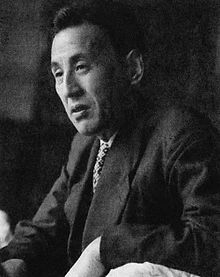Kiyoo Wadati
Appearance
Kiyoo Wadati 和達 清夫 | |
|---|---|
 | |
| Born | September 8, 1902 Nagoya, Japan |
| Died | January 5, 1995 (aged 92) Tokyo, Japan |
| Nationality | Japanese |
| Alma mater | Imperial University of Tokyo |
| Known for | Wadati–Benioff zone |
| Scientific career | |
| Fields | seismology |
| Institutions | Central Meteorological Observatory |
Kiyoo Wadati (和達 清夫, Wadachi Kiyoo, September 8, 1902 – January 5, 1995) was an early seismologist at the Central Meteorological Observatory of Japan (now known as the Japan Meteorological Agency), researching deep (subduction zone) earthquakes. His name is attached to the Wadati–Benioff zone. It was Wadati's 1928 paper on shallow and deep earthquakes, comparing maximum below surface displacement against distance from the epicentre, which led Charles Richter to develop his earthquake magnitude scale in 1935.[1]
See also
[edit]References
[edit]- ^ Suzuki, Yasumoto (2008). "Wadati, Kiyoo". Complete Dictionary of Scientific Biography. Vol. 25. Detroit: Charles Scribner's Sons. pp. 199–201. Retrieved 7 September 2012.
- Frohlich, Cliff (1987). "Kiyoo Wadati and Early Research on Deep Focus Earthquakes: Introduction to Special Section on Deep and Intermediate Focus Earthquakes". Journal of Geophysical Research. 92 (B13): 13777–13788. doi:10.1029/JB092iB13p13777.
- Suzuki, Yasumoto (2001). "Kiyoo Wadati and the path to the discovery of the intermediate-deep earthquake zone". Episodes. 24 (2): 118–123. Retrieved 10 December 2022.
External links
[edit]
